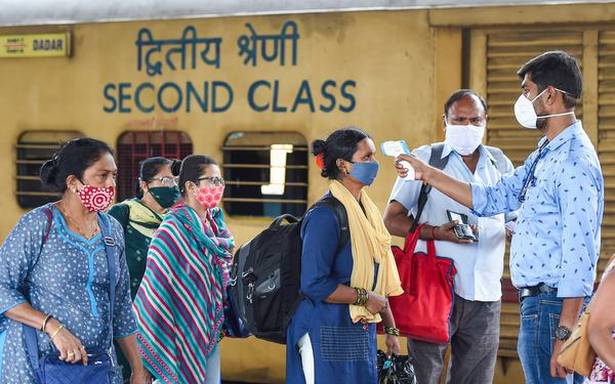Globally, there are believed to be 13 sublineages of Delta with characteristic genetic mutations.
The Delta variant remains most responsible for the continuing spread of infections in India, according to a weekly update from the India Sars Cov2 Genome Consortium (INSACOG), a repository of labs tasked with monitoring the coronavirus variants.
According to an August 16 report by the consortium, of the 49,867 coronavirus samples analysed for their genetic composition, about two thirds — 30,230 — were among the internationally classified Variants of Concern or Variants of Interest (VoC/VoI).
Of these nearly 20,000 were the Delta variant (AY.2) and about 5,000 its associated lineages (AY.1 and AY.3).
“The Delta variant is the major VOC in India at this time. Continuing outbreaks across India are attributable to Delta, a susceptible population, reduced vaccine effectiveness in blocking transmission, and opportunities for transmission. Vaccination continues to be very effective in reducing severe disease and death. Public health measures to reduce transmission and vaccination remain critical,” says an accompanying note.
Also read: Data | Delta variant drives COVID-19 infection surge in the world
Globally, there are believed to be 13 sublineages of Delta with characteristic genetic mutations. AY.1, AY.2 and AY.3 are the predominant ones and also found in India. AY.3.1 is a recently classified sublineage of AY.3 in the United States. AY.12 is a sublineage of delta recently classified from Israel.
In 2 States
India is currently adding about 35,000 new cases a day, with about 75% coming from only two States: Kerala and Maharashtra. Kerala alone contributes about 20,000 cases, prompting concerns that a new variant may be driving the surge. The INSACOG, for now, has ruled this out.
“Vaccination breakthroughs (or infections after two vaccine doses) are common during Delta outbreaks and are expected in India as well. Concern regarding appearance of new variants should be calibrated in the context of such data. As of now sequencing of vaccination breakthroughs in India is also showing a very high proportion of Delta variant. Investigations for any new variants are ongoing,” their note adds.
The INSACOG has since January sequenced around 72,000 samples and analysed—or slotted into lineages–nearly 49,867 of them.
Source: Read Full Article

